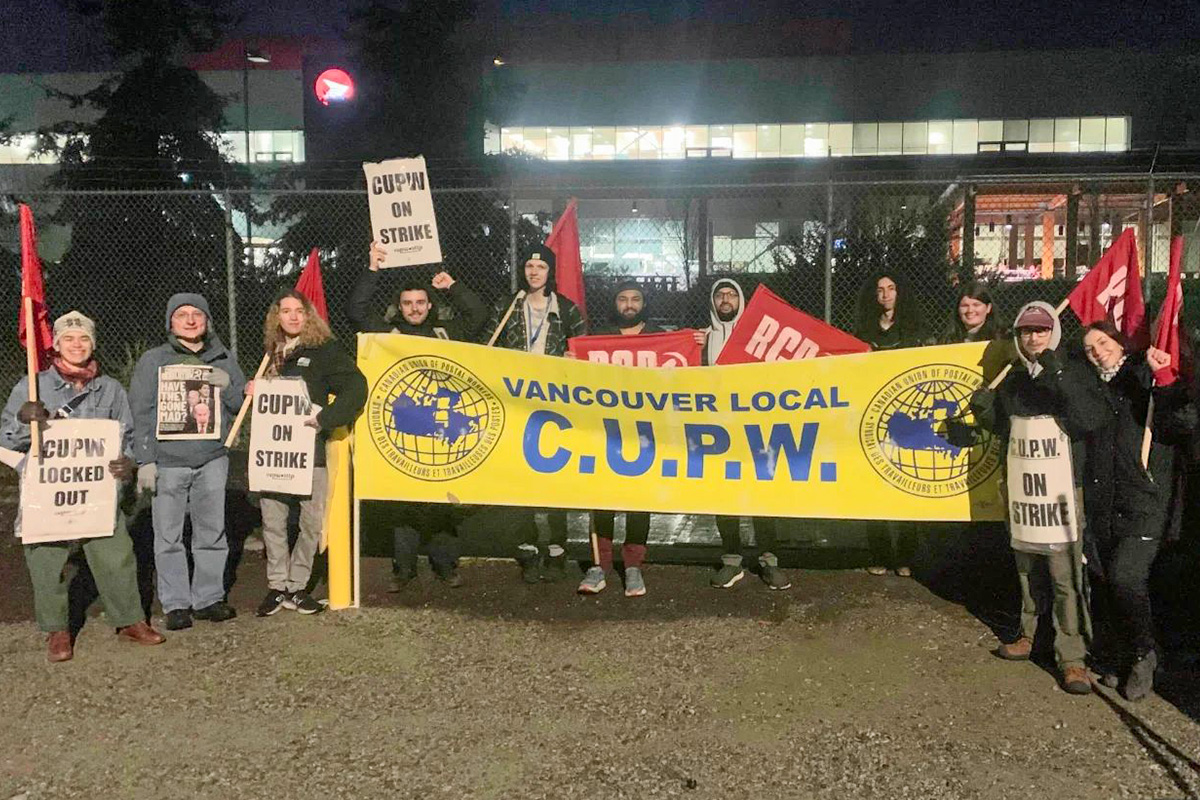
Two weeks of strike, two weeks of vicious attacks from Canada Post on its workers.
In the midst of the conflict, management illegally laid off workers. The employer also suspended benefits for its workers. The aim is obvious: to demoralize workers and get them to crawl back to work.
Last week, the CBC—in a rare article exposing the bosses—reported on the consequences of this odious punishment: a worker suffering from cancer has to pay $2,000 a day for his treatment.
Meanwhile, the negotiations are at a standstill. Both sides are far from an agreement, and for good reason. The workers are fighting to keep good jobs, while the bosses aim to implement similar conditions to the workers at Amazon. No real compromise is possible without workers losing out massively.
From the picket lines
The comrades of the Revolutionary Communist Party have been on the picket lines in Vancouver, Montreal, Edmonton, Calgary, Toronto and elsewhere. All workers understand that this strike is a turning point. Either workers push back management’s offensive, or it’s a decisive step in the race to the bottom.
The bosses’ message, echoed by all media, is that Canada Post is losing money and that there is no choice but to “flexibilize” work to compete with the likes of Amazon. They accuse the workers of not wanting to help “modernize” postal services.
These arguments of the bosses are not new. Whenever workers go on strike, they are portrayed as greedy, as not caring for the quality of services, and so on. But in fact, it is the bosses that are mismanaging the postal services.
Workers on the lines told us about the stupidity of management, which needlessly complicates the work of letter carriers, increasing costs in the process. For example, a worker in Vancouver spoke to us about the “separate sort and delivery” (SSD) system the bosses introduced.
He explained it as “pure hell” and “a complete waste of time”. Not only does it force a huge sorting burden on one or a few people, but letter carriers who used to sort their own routes based on their own system are now spending extra time re-sorting someone else’s work. As one worker at the South Burnaby international facility told us, workers transfer out of SSD facilities almost immediately after getting enough seniority to do so. What this shows is that ultimately, the workers should control their workplaces, not the incompetent bosses!
Workers everywhere are talking openly about defying a back-to-work order should it come from the federal government. One picket captain in Toronto, when asked what would happen in the event of back-to-work legislation or such an order, told us: “We won’t go back to work without an agreement!”
More explicitly, Mark Platt, the National director of the Ontario region of CUPW, responding to a question about defying back-to-work legislation, said:
“We can absolutely do it. CUPE did it in 2022 when they faced down the Ford government who was using the notwithstanding clause against them […] In my opinion, this is the time to defy the legislation. They’ve treated us like garbage […] The saying is ‘we’ve gone from heroes to zeros in a couple of years’ and we need to have assurance for all the dirty tactics they used on us, that it’s not gonna happen again.”
That’s the perspective we need.
Build a mass movement
However, the strike is now over two weeks old, with no resolution in sight. Beyond being prepared to defy a potential back-to-work order, the question remains: how do we win the strike?
The mood is there for a fight, but so far there has been little action to extend the struggle. There have been local actions, such as the occupation of a Liberal MP’s office in Vancouver, which we supported. As well, in Calgary, after a CUPW worker and RCP member helped organise a rally, the local leadership has now called for an official rally on the pickets on Dec. 4.
These actions are good. However, there is little or no national coordination for these. Isolated local actions are insufficient: it is imperative to extend the movement.
The union leadership should organize mass demonstrations in every major city, and above all, massively publicize them with the help of all other unions. Instead of just isolated actions by small groups of workers, the leadership could, for example, call for mass occupations of Liberal offices all across the country. The strike must become unavoidable. It needs to become a genuine mass movement.
For their part, the major trade union federations can play a role by actively mobilizing their own members to help bolster CUPW picket lines and other related actions. In some areas, management uses scabs to weaken the strike. The active involvement of other workers could help make possible large, hard pickets that would stop scabs dead in their tracks. The “Amazon-ification” of work will not stop at Canada Post. The entire working class has a stake in this fight—and it should be explained as such.
To build a genuine mass movement around this, ideas are needed. To do this, the leadership needs to wage an ideological war against management and the government. It should shout from the rooftops, through every available channel, the plight of the workers, the attacks by management, and explain how a defeat for CUPW will hurt the entire labour movement. It should use these mass rallies to speak to thousands of people about all this.
CUPW is historically one of the most militant unions in the country. A defeat for these workers would reverberate in other unions. The capitalist class and its government would feel confident to attack the good working conditions of others.
Management currently seems to be trying to wait out the struggle. The CUPW leadership needs to turn this strike into a genuine mass movement that cannot be ignored. A victory for CUPW would be a victory for all!

